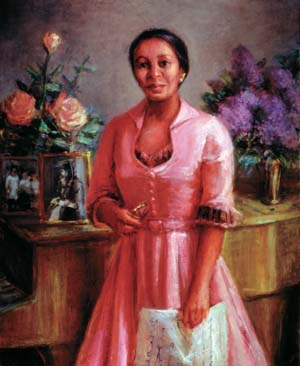 |
 |
| current issue |  |
past issues |  |
send a letter/news |  |
address update |  |
advertise |  |
about us |  |
alumni home |
On Ben's Farm
First in CourageElizabeth Virgil '26 quietly brought integration to UNH
by Mylinda Woodward '97

|
The year was 1926. UNH's senior class posed in front of Hamilton Smith's white pillars as a photographer took their picture for the yearbook. Near the center, surrounded by classmates with bobbed hair, sat Elizabeth Ann Virgil '26, who a few months later would be the first African-American to earn a bachelor's degree from UNH. Thus did the university become desegregated: quietly, uneventfully, without fanfare or noticeable dissent.
That Virgil would end up attending college at all was a notable achievement. As a child, she dreamed of going to college, but it seemed unlikely. Her mother, the daughter of a slave, worked as a housekeeper for Mrs. Mary Wood, a civic activist in Portsmouth, N.H.; her father, who was ill, lived in the South. In the 1920s, tuition and a room at UNH was around $300 a year--a bargain from today's perspective--but for many it put a college education out of reach.
As Virgil grew up, Wood and a friend noticed her aptitude in school and her desire to attend college. The two women took it upon themselves to help her win scholarships, including money for books. While their assistance was invaluable, it was Virgil herself who provided the courage and self-confidence needed to venture onto an all-white campus.
At UNH, Virgil was active in several clubs. She was highly musical, playing the piano and organ, and singing whenever she could. Her junior year, she helped found a vocal group called the Treble Clefs. While there were barriers in those days that would require decades to remove--she would not have been able to join a sorority, for example--there's no evidence that she was harassed. In the yearbook, the Granite editors often made fun of their classmates. "Rachel is a very exclusive young lady in spite of her great height." "Wally is a small, quiet little fellow, but so was Napoleon." "'The Yid' is trying for a B.A. in Agriculture, but missed his calling. He should have been a pawnbroker." * About Virgil, however, they merely noted that "Elizabeth says she loves to go to college because they have Glee Clubs in college. Nevertheless, she is consistently devoted to her majors and minors so we will not attempt to explain her good grades."
After graduation, she and 37 of her classmates found jobs in the field of education. Some became school administrators; it was not a coincidence that they all were men. But Virgil faced a different kind of roadblock: because of her race, she could not teach in New England. Her only option was to move to the South, where segregated schools created a demand for black teachers.
She taught at schools for blacks in several states. Once she was given a seventh-grade class where the ages ranged from 11 to 22. Short and petite, she was smaller than many of her students, but she learned quickly to show them who was boss. Virgil was an exceptional teacher, and the school sent her to Columbia Teachers College for advanced courses. In the late '30s, however, her mother became ill and she returned to Portsmouth to take care of her. She was forced to give up teaching; it would be 30 years before New Hampshire schools would hire African-Americans.
Instead, she demonstrated gas appliances and worked as a secretary and clerk typist. In 1951, she joined UNH, where she typed reports from data collected by soil conservation scientists. She found the work interesting--especially later on when women were allowed out into the field--and she stayed for 22 years.
Virgil's affection for UNH was steadfast, and in 1991, a few months before her death, the university returned the honor by commissioning her portrait and unveiling it at a reception. The painting by Grant Drumheller, professor of art at UNH, now greets students on the first floor of Dimond Library. She is a graceful looking woman in a pink dress; in one hand she holds reading glasses, in the other, a piece of paper--sheet music, perhaps, for the piano behind her.
Before she died, she established a scholarship in memory of her mother. "She encouraged us on so many impossible things because she believed that God was with us," she said. "I had opportunities offered to me that I never dreamed possible." The scholarship provides assistance to needy undergraduates. "I set up the fund especially for my people," she said. "But it's for anybody who wants it." ~
* Editor's note: This appalling example of anti-Semitism was, unfortunately, the rule rather than the exception in UNH's early decades.
blog comments powered by Disqus
